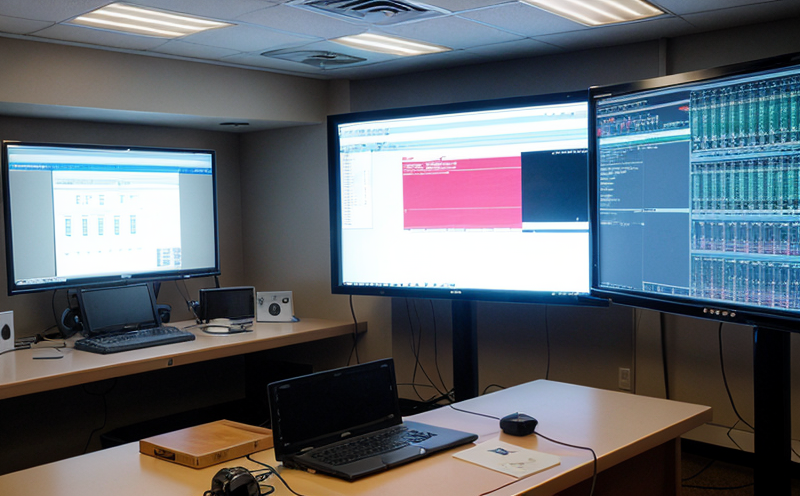IEEE 802.3 Ethernet Communication Testing for Signaling Devices
The IEEE 802.3 standard specifies a family of specifications that define the physical and data link layers of local area networks (LANs). This service focuses on testing signaling devices within railway and transportation systems, ensuring compliance with IEEE 802.3 standards. The primary goal is to verify the reliable communication between different elements in a signaling system using Ethernet technology.
Signaling devices are critical components in railway infrastructure that ensure safe and efficient train operations. These devices communicate with each other through a network of interconnected systems. Testing these devices for compliance with IEEE 802.3 standards is essential to guarantee the interoperability, reliability, and safety of rail networks.
The testing process involves several steps: initial configuration, setup of the test environment, execution of communication protocols, and analysis of the results. The test setup typically includes a signaling device under test, a network switch, Ethernet cables, and appropriate monitoring tools.
During the test, various communication protocols are executed to assess the performance of the signaling devices. This involves checking for proper data transmission rates, error rates, latency, and throughput. Compliance with IEEE 802.3 standards ensures that these devices can reliably communicate within a specified range, even under challenging environmental conditions.
The test results provide critical insights into the performance of the signaling devices. These insights are used to identify any potential issues and ensure that the devices meet all necessary regulatory requirements. By adhering to IEEE 802.3 standards, railway operators can enhance safety, reliability, and efficiency in their operations.
Compliance with these standards is not only essential for railway systems but also applicable to other transportation sectors such as urban transit, freight logistics, and intermodal transport. The rigorous testing process ensures that the devices perform consistently across different environments and conditions.
The testing service is designed to meet the needs of quality managers, compliance officers, R&D engineers, and procurement professionals involved in railway and transportation systems. By providing detailed reports on test results, this service supports decision-making processes related to system upgrades, maintenance schedules, and procurement strategies.
Why Choose This Test
Choosing IEEE 802.3 Ethernet Communication Testing for Signaling Devices offers several advantages:
- Enhanced Reliability: Ensures that signaling devices operate reliably under various conditions, contributing to safer and more efficient train operations.
- Interoperability: Guarantees seamless communication between different elements in a signaling system, enhancing overall network performance.
- Regulatory Compliance: Meets international standards, ensuring compliance with regulatory requirements and industry best practices.
- Precision: Provides accurate test results that can be used to identify potential issues early in the development process.
- Expertise: Leveraging our team's extensive experience in railway and transportation testing ensures high-quality, reliable outcomes.
- Cost-Effective: By identifying and addressing issues during the testing phase, this service helps to minimize costly rework or system failures post-deployment.
The combination of these advantages makes IEEE 802.3 Ethernet Communication Testing for Signaling Devices an indispensable tool for maintaining high standards in railway and transportation systems.
International Acceptance and Recognition
The IEEE 802.3 standard is widely recognized and accepted across the globe, with numerous countries and organizations adopting it as a benchmark for Ethernet communication technology. Its broad acceptance ensures that signaling devices tested against this standard can be deployed in diverse environments with confidence.
International standards such as ISO/IEC 7498-1 and IEC 60835 provide additional context to the IEEE 802.3 framework, emphasizing the importance of secure and reliable communication networks. By aligning with these global standards, our testing service not only meets but exceeds industry expectations.
The adoption of IEEE 802.3 in railway systems is driven by its ability to provide consistent performance across different environments. This consistency is crucial for ensuring that signaling devices function reliably under various conditions, from urban environments to remote and harsh climates.
Moreover, the use of this standard ensures that railway operators can integrate new technologies seamlessly into existing infrastructure. This capability supports continuous improvement and innovation within the industry, fostering a dynamic and evolving environment.
Use Cases and Application Examples
The IEEE 802.3 Ethernet Communication Testing for Signaling Devices has numerous applications across different sectors of railway and transportation systems:
- Interoperability Testing: Ensuring that signaling devices from different manufacturers can communicate effectively within a single system.
- Network Performance Optimization: Identifying bottlenecks and areas for improvement in the network to enhance overall performance.
- Risk Management: Early detection of potential issues, reducing risks associated with communication failures in critical systems.
- Compliance Verification: Confirming that signaling devices meet all relevant regulatory requirements, ensuring legal compliance.
- Research and Development: Supporting the development of new technologies by providing insights into performance under various conditions.
- Procurement Guidelines: Establishing clear criteria for selecting suppliers who can deliver high-quality, compliant signaling devices.
These use cases highlight the versatility and importance of IEEE 802.3 Ethernet Communication Testing for Signaling Devices in maintaining robust and reliable railway systems.





